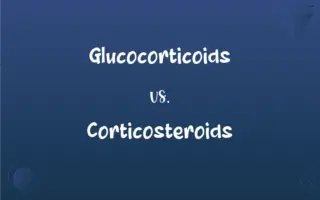Agar vs. Carrageenan: What's the Difference?
Edited by Aimie Carlson || By Harlon Moss || Published on January 10, 2024
Agar is a gelatinous substance from seaweed used in food and labs; Carrageenan is a seaweed extract used as a thickener and stabilizer in food.

Key Differences
Agar is derived from red algae and is a mixture of two components: agarose and agaropectin. Carrageenan, also from red algae, contains various polysaccharides, which differ based on the type of carrageenan.
In the food industry, agar is used as a vegetarian gelatin substitute and thickener, known for its strong gelling properties. Carrageenan, on the other hand, is widely used as a thickener, stabilizer, and gelling agent, particularly in dairy and meat products.
Agar forms firm gels at low concentrations and doesn't melt easily, making it ideal for high-temperature cooking. Carrageenan forms softer gels and is often used to improve the texture of foods, but it does not gel as strongly as agar.
Agar is extensively used in microbiology for culture media due to its stability and non-reactivity with most chemicals. Carrageenan, while not typically used in lab settings, has applications in pharmaceuticals as a stabilizer in various formulations.
Agar is known for its dietary fiber content and laxative effect. Carrageenan, although generally considered safe, has been a subject of debate regarding its potential inflammatory effects and digestibility.
ADVERTISEMENT
Comparison Chart
Source
Red algae
Red algae
Key Components
Agarose and agaropectin
Various polysaccharides
Primary Use in Food
Vegetarian gelatin substitute, thickener
Thickener, stabilizer, gelling agent
Gelling Properties
Strong gelling, heat stable
Softer gels, less heat stability
Applications Outside Food
Microbiology culture media
Pharmaceuticals as stabilizer
ADVERTISEMENT
Agar and Carrageenan Definitions
Agar
Microbiology Medium.
Scientists grow bacteria on agar plates.
Carrageenan
Food Thickener.
Carrageenan is added to ice cream for smoothness.
Agar
Gelatinous Substance.
Agar is used to make vegetarian jellies.
Carrageenan
Stabilizer in Food.
Carrageenan stabilizes the texture of yogurt.
Agar
Vegetarian Thickener.
Agar acts as a thickening agent in sauces.
Carrageenan
Gelling Agent.
Carrageenan helps in setting desserts without heat.
Agar
Dietary Fiber Source.
Agar is valued for its high fiber content.
Carrageenan
Dairy Product Enhancer.
Carrageenan improves the consistency of milk products.
Agar
Heat-Stable Gelling Agent.
Agar can withstand high cooking temperatures.
Carrageenan
Pharmaceutical Ingredient.
Carrageenan is used in some toothpaste formulations.
Agar
A gelatinous material derived from certain marine algae. It is used as a base for bacterial culture media and as a stabilizer and thickener in many food products.
Carrageenan
Any of a group of closely related colloids derived from Irish moss and several other red algae, widely used as a thickening, stabilizing, emulsifying, or suspending agent in industrial, pharmaceutical, and food products.
Agar
A culture medium containing this material.
Carrageenan
A food additive made from a purified extract of red seaweed, commonly used as a thickening agent.
Agar
A gelatinous material obtained from red algae, especially Gracilaria species, used as a bacterial culture medium, in electrophoresis and as a food additive.
Carrageenan
A colloidal material obtained from seaweed or Irish moss, used as an thickening or emulsifying agent and for stabilizing foods, cosmetics, and pharmaceuticals.
Agar
A culture medium based on this material.
Carrageenan
A colloidal extract from carrageen seaweed and other red algae
Agar
Agarwood
Agar
Common shortened form of agar-agar{2}.
Agar
Any culture medium that uses agar as the gelling agent; - used especially with a modifying prefix, as, EMB agar. The term is applied both to the dehydrated medium powder containing agar and to the gelatinous medium prepared from it.
Agar
Any culture medium that uses agar as the gelling agent
Agar
A colloidal extract of algae; used especially in culture media and as a gelling agent in foods
FAQs
What is agar?
A gelatinous substance from red algae, used in food and labs.
What is carrageenan?
A seaweed extract used as a food thickener and stabilizer.
Is carrageenan vegan?
Yes, it's derived from seaweed and suitable for vegans.
How are agar and carrageenan similar?
Both are derived from red algae and used in the food industry.
Are there health concerns with carrageenan?
It's generally safe, but some concerns about inflammation exist.
Why is agar used in laboratories?
For its non-reactive nature and ability to culture microorganisms.
Can agar be used in baking?
Yes, as a thickener and stabilizer in high-temperature cooking.
Does agar have nutritional value?
Yes, it's high in fiber and has a laxative effect.
Can agar be used in vegan cooking?
Yes, it's a popular vegan substitute for gelatin.
Is carrageenan found in dairy products?
Commonly, as it improves texture and stability.
Is agar allergenic?
Rarely, it's generally considered hypoallergenic.
Are both agar and carrageenan gluten-free?
Yes, they are naturally gluten-free.
How does agar affect the texture of food?
It creates a firm and clear gel texture.
What's the gelling strength of agar compared to carrageenan?
Agar forms stronger, more heat-stable gels than carrageenan.
How does carrageenan enhance dairy products?
By improving creaminess and preventing separation.
Can carrageenan be used in meat products?
Yes, to improve texture and moisture retention.
Is agar suitable for all diets?
Yes, it's vegetarian, vegan, and gluten-free.
Can both agar and carrageenan be used in desserts?
Yes, both are used to thicken and stabilize desserts.
Can carrageenan affect digestion?
Some studies suggest it might, but more research is needed.
Can carrageenan be used in vegan recipes?
Yes, it's suitable for vegan culinary applications.
About Author
Written by
Harlon MossHarlon is a seasoned quality moderator and accomplished content writer for Difference Wiki. An alumnus of the prestigious University of California, he earned his degree in Computer Science. Leveraging his academic background, Harlon brings a meticulous and informed perspective to his work, ensuring content accuracy and excellence.
Edited by
Aimie CarlsonAimie Carlson, holding a master's degree in English literature, is a fervent English language enthusiast. She lends her writing talents to Difference Wiki, a prominent website that specializes in comparisons, offering readers insightful analyses that both captivate and inform.






































































